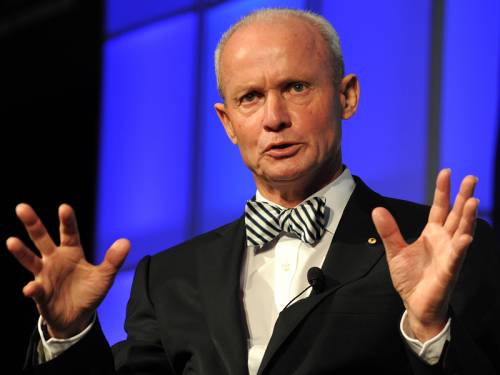
No-one in the 1980s in Australia saw the future direction of aviation with more clarity and purpose than James Strong, who has died at 68.
His understanding of the three big drivers of change in that decade was detailed, lucid and sometimes brutal in that he was conscious of what those changes would bring and very clear about resistance to such changes ultimately proving futile.
Those change drivers were US deregulation, (late 70s) the privatization of national carriers (early to mid 80s) and the branded global alliances (the 90s) which of late, have driven some airlines including Qantas, much more toward targeted business partnerships (with Emirates and American Airlines).
Strong, who rebranded TAA as Australian Airlines, and then took control of Qantas after it was merged with Australian and privatized and then listed, had a profound influence over the aviation media of the day, during times when every major and second tier newspaper in Australia had a senior reporter dedicated to reporting every aspect of the industry.
When the first Australian Airlines liveried Boeing 737-300 arrived at the old TAA domestic terminal at Sydney Airport the entire media contingent met Strong each wearing a bow tie, probably the only time James Strong abandoned one of his somber change sermons and burst into laughter.
The message about how different, and at times difficult Australian aviation would become, was one that media and government ported into a wider discussion about privatization, given the visibility of the iconic airline brands.
Strong was an ally ideologically and in later in business terms, with Colin Marshall, who died last year, and who guided British Airways through its privatization and predicted the rise of branded global marketing alliances like oneworld, in which both BA and Qantas were founding members, for ten years before both Star and oneworld crystallised in the late 90s.
The long lasting and soon to end joint services agreement between British Airways and Qantas was very much a Strong and Marshall creation, and their championing of both broad alliances and specific commercial relationships made them very influential thinkers and doers in the last decades of the 20th century.
Strong was always opposed to or persuasively wary of the nature and consequences of low cost carriers or ‘commodity carriers’ as he often referred to them at the time. However he became so persuaded of their potency and inevitability that he threw himself behind Project Savior at Qantas which in 2003 led to the announcement of the Jetstar second brand and strategy, which began service in 2004.
At one press conference late in 2000 or early in 2001, Strong was needled (cough) by a reporter pointing out that his former customers were queued up on the footpath from the old low cost carrier demountable terminal to the then Ansett terminal at Sydney Airport to which he retorted “what do you expect us to do, have them arrested”.
James Strong was always forthright on the need for Australia to have an effective and iconic national Qantas brand and even more direct about the imperative as he saw it for lifting the foreign equity cap on shareholders in Qantas, not to sell more of Qantas to foreign investors (which is limited to 49% of stock) but to force Australian investors to pay the same prices for quality airline stocks that then applied in offshore bourses.
It was a matter of bringing ‘price tension’ of the upwards type to bear on Qantas shares.
Strong was an entertaining and insightful and at times uncomfortably rigorous observer of human and corporate behavior. There were moments when he confided very important guiding thoughts and revelations to trusted confidants.
His death does not release us from that trust, yet their force and influence continues.








Crikey is committed to hosting lively discussions. Help us keep the conversation useful, interesting and welcoming. We aim to publish comments quickly in the interest of promoting robust conversation, but we’re a small team and we deploy filters to protect against legal risk. Occasionally your comment may be held up while we review, but we’re working as fast as we can to keep the conversation rolling.
The Crikey comment section is members-only content. Please subscribe to leave a comment.
The Crikey comment section is members-only content. Please login to leave a comment.